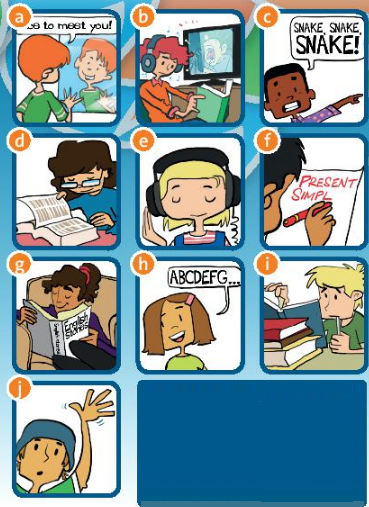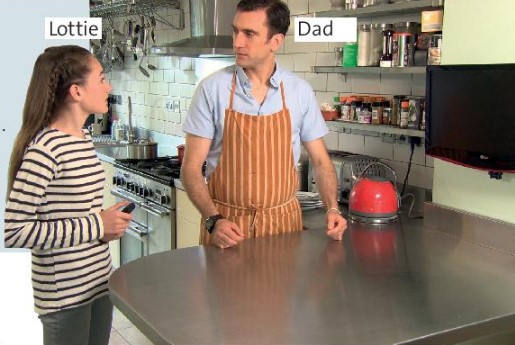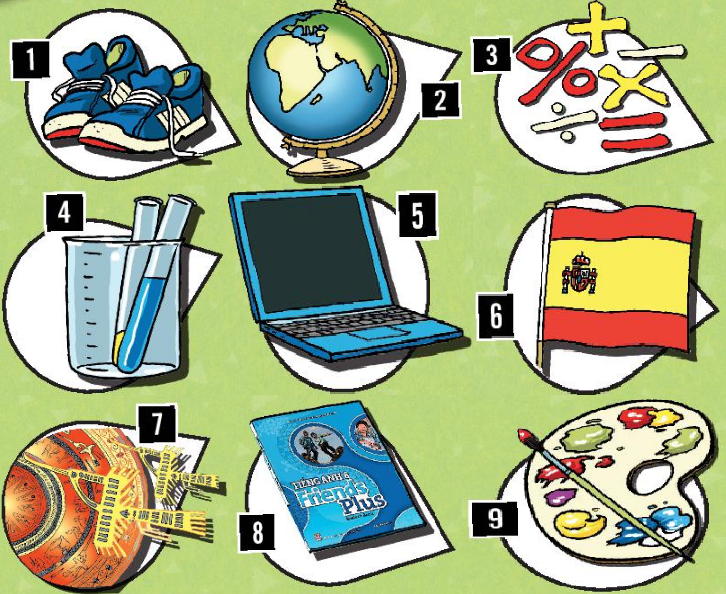Hãy nhập câu hỏi của bạn vào đây, nếu là tài khoản VIP, bạn sẽ được ưu tiên trả lời.

Tạm dịch:
Bạn có phải là học sinh SIÊU ngôn ngữ?
Trả lời các câu hỏi. Ghi 1 điểm cho mỗi câu trả lời CÓ. Sau đó nhìn vào đáp án.
1. Bạn có bao giờ nghe tiếng Anh khi bạn không ở trường?
2. Bạn có biết bảng chữ cái? Bạn có thể đánh vần tên của bạn bằng tiếng Anh không?
3. Bạn có kiểm tra các từ trong từ điển hoặc danh sách từ không?
4. Bạn có lặp lại một từ mới nếu bạn muốn học nó không?
5. Bạn có bao giờ luyện phát âm không?
6. Bạn có ôn tập trước khi thi không?
7. Bạn có đặt câu hỏi khi bạn không hiểu?
8. Bạn có thường tập trung khi làm bài tập không?
9. Bạn có ghi chú về ngữ pháp hoặc viết từ vựng mới vào sổ tay không?
10. Bạn có bao giờ đọc sách, bài báo hoặc truyện tranh bằng tiếng Anh không?

Complete the text with the correct form of the verbs in brackets
After finishing secondary school,some studentsdecide......to take.....(take) a gap year and go ...traveling.............(travel).I think it is one of the best decisions a young person can make.My brother ...went..(go) around South America and the USA last year and i hope ....to go.(go) to Australia after my exams.Some people are worried about travelling alone because they think it might...be...(be) dangerous. But i think it's fine if you plan your trip carefully and you ....will not take...(not take) risk. Of course you can travel with a friend.My best friend and i ...are planning......(plan) our trip at the moment.There is a lot of information about gap years on the Internet.But i think it's a good idea to talk to people who....have...already.....gone.....(do) their trip.You can find out such a lot.

A robot cannot think or do things alone. People use a computer to control it. Today, robots are not very popular because they are too expensive, but they are very useful. They can help us save a lot of time and work. A robot can do the same work for 24 hours and yet it does not complain or get tired . In the US, people use robots to guard some important places. These robots can listen to certain noises and send signals for help if there's troubleor danger. In Japan, people use robots in factories to buil cars. In the future, scientists will design many types of intelligent robots. Their robots will be able to do many morecomplicated things. However, some people do not like robots. They fear that one day robots will be too powerful.
1. Are robots cheap?
No, they aren't.
2. How long can a robot do the save work?
A robot can do the same work for 24 hours.
3. What can robots do to guard some important places?
These robots can listen to certain noises and send signals for help if there's troubleor danger.
4. Do people in Japan use robts in factories to build cars?
Yes, they do.
5. Why don't some people like robots?
Because they fear that one day robots will be too powerful.
1. No, they aren't
2. A robot can do the same work for 24 hours
3.These robots can listen to certain noises and send signals for help if there's troubleor danger.
4. Yes , they do
5.Because they fear that one day robots will be too powerful.

1. watch that wildlife programme on TV
2. It's really good
3. it's time for dinner
4. watch TV later
She can watch the TV programme later.
(Bạn ấy có thể xem chương trình tivi sau.)
Lottie: Dad.
Dad: Yes?
Lottie: Is it OK if I watch that wildlife programme on TV?
Dad: No, I'm afraid you can't.
Lottie: But Dad, why not? It's really good.
Dad: I'm sorry, but it's time for dinner.
Lottie: Oh, OK. Can I watch TV later, then?
Dad: Yes, of course you can.
Lottie: Great. Thanks, Dad.
Tạm dịch bài hội thoại:
Lottie: Bố ơi.
Bố: Sao thế con?
Lottie: Con có thể xem chương trình về động vật hoang dã trên TV được không ạ?
Bố: Không, bố e là con không thể.
Lottie: Nhưng bố ơi, tại sao không ạ? Nó thật sự hay lắm.
Bố: Bố rất tiếc, nhưng đến giờ ăn tối rồi con.
Lottie: Vâng ạ. Vậy con có thể xem TV sau được không ạ?
Bố: Ừm, tất nhiên là con có thể.
Lottie: Tuyệt vời. Con cảm ơn bố ạ.

1. PE
2. geography
3. maths
4. science
5. ICT
6. Spanish
7. history
8. English
9. art
1. Are you good at PE?
(Bạn có giỏi môn thể dục không?)
2. When’s our next geography exam?
(Khi nào thì kỳ thi Địa lý tiếp theo của chúng ta?)
3. Are you a maths genius?
(Bạn có phải là một thiên tài toán học không?)
4. Is your science notebook organised?
(Sổ ghi chép khoa học của bạn có được sắp xếp không?)
5. Have we got an ICT class tomorrow?
(Ngày mai chúng ta có tiết học Công nghệ thông tin và truyền thông không?)
6. Do you study other languages, like Spanish?
(Bạn có học các ngôn ngữ khác, như tiếng Tây Ban Nha không?)
7. Have you got history homework today?
(Hôm nay bạn có bài tập Lịch sử không?)
8. Do you think that our English textbook is interesting?
(Bạn có nghĩ sách giáo khoa tiếng Anh của chúng ta thú vị không?)
9. How many art teachers are there in the school?
(Có bao nhiêu giáo viên mỹ thuật trong trường?)

I. Circle best option A, B, C, or D to complete the following sentences.
1. I feel tired. I'd like ............... .
A. to sit down B. to run C. some noodles D. some fish
2. ............... her lips full or thin?
A. Do B. Does C. Are D. Is
3. This sign says "Stop!". We ............... go straight ahead.
A. can B. should C. must D. mustn't
4. Mr. Nam gets up at 7.00 and eats ............... .
A. a big break fast B. big breakfast C. the big breakfast D. a breakfast big
5. Mr. Quang and the farmer are loading the truck ............... vegetables.
A. on B. with C. at D. of
6. The weather is ............... today than yesterday.
A. so better B. verry better C. too better D. much better
7. ............... ? ~ We play badminton and swim.
A. What sports do you and your brother like?
B. Which sports do you and your brother play?
C. When do you and your brother play sports?
D. What are you and your brother doing?
8. There is ............... rice in the jar. We can't cook rice now.
A. a little B. little C. a few D. few
9. Would you like ............... noodles? ~ I'm fuul. I don't want ............... more.
A. any/ any B. some/ some C. any/ some D. some/ any
10. I'm going to the ............... now. I want to buy some bread.
A. post office B. drugstore C. bakery D. toy store

Airports
You can fly to places all over (1) ................. world from airports. Planes and helicopters leave and arrive (2) .................. day. You often take a plane from an airport when you go to (3) .................. country on holiday or for work. Some people go to airports because they (4) ............... watching planes there. You can get to airports (5) ................ bus, taxi or car. Sometimes you go there to meet friends (6) .................. are arriving from other places. In most airports there are shops, cafés and toilet. People (7) ................. buy things before they get on the plane. These things are usually cheaper in airports (8) .................... in other shops. You have to wait in a place called the 'departure lounge' befor you fly. A lot of people (9) ................... in airports. People have to clean them all the time because (10) .................... are very big and a lot of people use them. You can see pilots there, too. There are (11) ..................... policemen and policewomen, and mechanics who work on the planes before they fly.
1. a / an / the
2. some / every / any
3. many / another / other
4. enjoys / enjoy / enjoyed
5. by / for / with
6. what / which / who
7. can / are / have
8. that / than / then
9. works / working / work
10. they / it / you
11. twice / also / together

1. (1)____
A. climbed
B. climb
C. climbing
2. (2)___
A. like
B. from
C. for
3. (3)___
A. them
B. those
C. their
4. (4)___
A. larger
B. largest
C. large
5. (5)____
A. Both
B. One
C. He
6. (6)____
A. every
B. all
C. each
7. (7)____
A. many
B. more
C. much
8. (8)____
A. there
B. anything
C. it



1.hear
2.grow
3.kill
4.drink
5.survive
6.see
7.see
8.fly
9.run
1. Can elephants (1) hear with their ears and their feet?
(Voi có nghe được bằng tai và bằng chân không?)
2. How big can a gorilla (2) grow?
(Một con khỉ đột có thể phát triển lớn đến mức nào?)
3. Some scorpions are dangerous. Can a scorpion (3) kill a human?
(Một số loài bọ cạp rất nguy hiểm. Bọ cạp có thể giết người không?)
4. Camels don't (4) drink a lot of water. How many months can a camel (5) survive without water?
(Lạc đà không uống nhiều nước. Lạc đà có thể sống được bao nhiêu tháng nếu không có nước?)
5. How far can an eagle (6) see? It can (7) see a small animal from a distance of
(Đại bàng có thể nhìn thấy bao xa? Nó có thể nhìn thấy một con vật nhỏ từ khoảng cách…)
6. Ostriches can't (8) fly but how fast can they (9) run?
(Đà điểu không thể bay nhưng chúng chạy nhanh đến mức nào?)